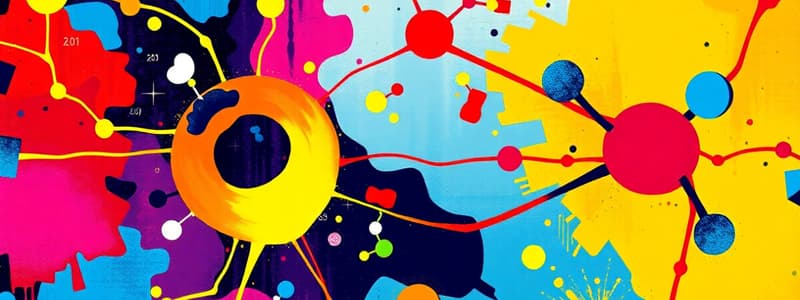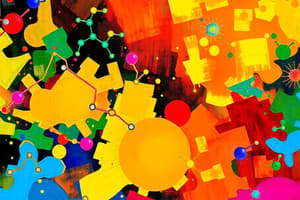Podcast
Questions and Answers
What are the fundamental building blocks of matter?
What are the fundamental building blocks of matter?
- Mixtures and solutions
- Physical and chemical properties
- Atoms and molecules
- Elements and compounds (correct)
Why is understanding the distinction between elements and compounds important?
Why is understanding the distinction between elements and compounds important?
- It is key to grasping the complexities of the natural world. (correct)
- It ensures more successful experiments in biology.
- It aids in memorizing the periodic table.
- It simplifies calculations in mathematics.
How can mastering elements and compounds benefit you?
How can mastering elements and compounds benefit you?
- It enhances understanding of scientific principles. (correct)
- It increases knowledge of historical events.
- It guarantees success in laboratory work.
- It improves computing skills.
In which area does a strong knowledge of elements and compounds play a critical role?
In which area does a strong knowledge of elements and compounds play a critical role?
What foundational knowledge is important for exploring advanced topics in chemistry?
What foundational knowledge is important for exploring advanced topics in chemistry?
What defines an element in terms of atomic structure?
What defines an element in terms of atomic structure?
Which of the following correctly represents the chemical symbol for iron?
Which of the following correctly represents the chemical symbol for iron?
What is true about compounds?
What is true about compounds?
Where can elements be found organized based on their atomic number?
Where can elements be found organized based on their atomic number?
Which element is considered the backbone of organic chemistry?
Which element is considered the backbone of organic chemistry?
What is a characteristic that distinguishes elements from compounds?
What is a characteristic that distinguishes elements from compounds?
What is the atomic number of hydrogen?
What is the atomic number of hydrogen?
What type of bond is formed when electrons are transferred from one atom to another?
What type of bond is formed when electrons are transferred from one atom to another?
Which of the following best describes a compound?
Which of the following best describes a compound?
What is the chemical formula for water?
What is the chemical formula for water?
Which type of reaction involves two or more substances combining to form a new compound?
Which type of reaction involves two or more substances combining to form a new compound?
Which physical change is NOT an example of a physical process?
Which physical change is NOT an example of a physical process?
What is a characteristic property of compounds?
What is a characteristic property of compounds?
In which scenario would a chemical change occur?
In which scenario would a chemical change occur?
Which compound is essential for photosynthesis?
Which compound is essential for photosynthesis?
What type of bond involves a pooling of electrons among metal atoms?
What type of bond involves a pooling of electrons among metal atoms?
What distinguishes elements from compounds?
What distinguishes elements from compounds?
Flashcards are hidden until you start studying
Study Notes
Elements
- Pure substances that cannot be broken down into simpler substances by chemical means.
- Basic building blocks of matter.
- Characterized by the type of atoms they contain.
- Defined by the number of protons in their atomic nucleus (atomic number).
- Each element has a unique atomic number.
- Represented by chemical symbols (1 or 2 letters).
- Have distinct physical (color, density, melting point) and chemical properties (reactivity, oxidation states).
- Organized in the Periodic Table based on atomic number and chemical properties.
Compounds
- Substances composed of two or more elements chemically combined in fixed proportions.
- Have properties that are distinct from their constituent elements.
- Formed through chemical reactions, creating new substances with different properties.
Types of Chemical Bonds in Compounds
- Ionic Bonds: Formed when electrons are transferred from one atom to another, creating positive and negative ions that attract each other (Example: Sodium Chloride (NaCl)).
- Covalent Bonds: Formed when atoms share electrons to achieve stable electron configurations (Example: Water (H₂O)).
- Metallic Bonds: Involve the pooling of electrons among metal atoms, resulting in properties such as electrical conductivity (Example: Copper (Cu)).
Differences Between Elements and Compounds
- Composition:
- Elements: Consist of only one type of atom.
- Compounds: Composed of two or more different types of atoms chemically combined.
- Properties:
- Elements: Retain their individual properties.
- Compounds: Exhibit properties that are different from those of their constituent elements.
- Separation:
- Elements: Cannot be broken down into simpler substances by chemical means.
- Compounds: Can be broken down into their constituent elements or simpler compounds through chemical reactions.
- Chemical Reactions:
- Elements: Participate in chemical reactions to form compounds or other elements.
- Compounds: Can undergo chemical reactions to form new compounds or elements.
Types of Chemical Reactions
- Synthesis Reactions: Two or more substances combine to form a new compound.
- Decomposition Reactions: A compound breaks down into two or more simpler substances.
- Single Replacement Reactions: An element replaces another element in a compound.
- Double Replacement Reactions: The ions in two compounds exchange places to form two new compounds.
Physical vs. Chemical Changes
- Physical Changes: Changes in the state or appearance of a substance without altering its chemical composition.
- Chemical Changes: Changes that result in the formation of new substances with different properties.
Importance of Elements and Compounds in Daily Life
- Cooking: Involves both physical and chemical changes.
- Medicine: Pharmaceuticals are compounds that interact with the body to treat diseases.
- Environmental Science: Understanding elements and compounds helps in assessing environmental impacts.
- Materials Science: The development of new materials, such as polymers and alloys, relies on understanding the properties of elements and compounds.
- Energy Production: Energy sources involve reactions of compounds and elements.
Studying That Suits You
Use AI to generate personalized quizzes and flashcards to suit your learning preferences.




